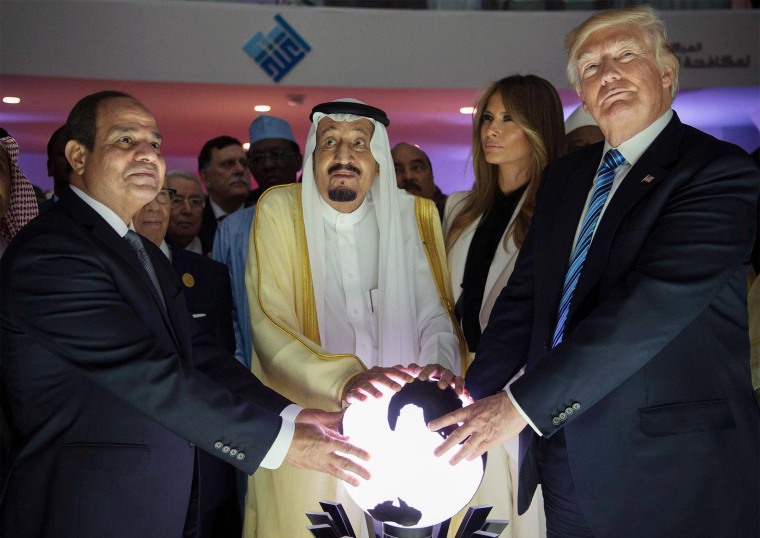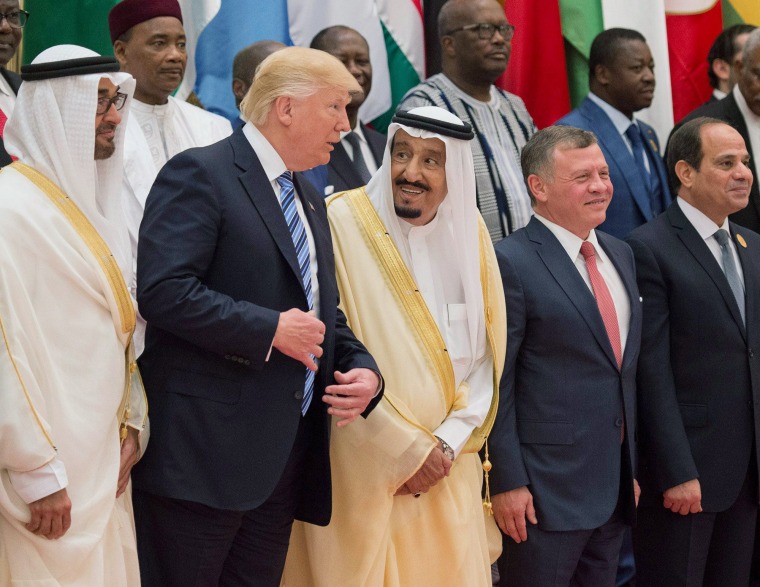RIYADH, Saudi Arabia — President Donald Trump's remarkable visit to Saudi Arabia ended as it began: with warm applause from Saudi leaders who displayed real pride in the fact that an American president chose the religious center of the Muslim world as the first stop on his first trip abroad.
Political leaders proclaimed a new era, Saudis gushed at the "elegantly respectful" look of first lady Melania Trump, analysts hailed the biggest arms deal in American history while Sunday newspapers praised the renewal of "this natural American-Muslim alliance" that in the 1980s had fought "successfully against atheism and communism."
There is something remarkable too about the leader of the Western world speaking in the city where Osama bin Laden was born. A New Yorker, Trump, addressing Muslims in the country where 11 of the 19 terrorists of the September 11th attacks were born.
Yet here he was urging more than 40 Muslim leaders to unite to "drive out the terrorists and drive out the extremists ... drive them out of this earth."
This, he said, is a battle between good and evil and urged Muslim countries had to "fulfill their part of the burden" — not just wait for American intervention.
But there was none of the inflammatory language typical of domestic Trump. He did not use the phrase "radical Islamic terrorism," which he has specifically used several times before and which is considered offensive by many. In fact, he said he was "not here to lecture" the Muslim leaders, or to impose an American way of life.

At the final major event of his visit — a conference on social media and countering terrorism — the president's schedule got squeezed and he had to leave the speaking to his daughter Ivanka.
"This young generation is a generation that can build a future of tolerance, of hope and of peace," she said. "And that's what this last day has been around: tolerance and hope and peace."
Still, there is a definite security threat here and it's clear it's being taken seriously: Every major road in Riyadh is lined with troops and police.
But surrounded by huge photographs of himself in a city dripping in gold, while making deals worth hundreds of billions of dollars — Trump may have felt he was in a special but familiar place.
Everywhere you look in Central Riyadh there are giant images of Trump and the Saudi King side by side. "Together," they proclaim, "we will prevail," a slogan that boats of a renewed military and economic bond between the U.S. and Saudi Arabia. An alliance against rivals in Iran and threats from ISIS.
Here, all is apparently forgiven. They have forgotten Candidate Trump, who railed against Muslims on the campaign trail, and even Early President Trump, who tried to push through a ban on Muslims entering America. Now they have Best Friend Trump, who sees in the Saudis an opportunity to make money and buy peace in the region.
There are similarities between the leaders of Saudi Arabia and the United States. The rulers of the Desert Kingdom are a family, the al-Sauds — King Salman and his many Princes. They do business in the billions of dollars but often in a personal, traditionally Arab way.
That’s been Trump’s way too, and he’s done business here in the desert through his family. The arms deal the two countries have signed, worth at least 100 billion dollars, was done with the help of Trump’s son-in-law Jared Kushner. He amazed a visiting Saudi delegation at the White House earlier this year by picking up the phone to the boss of Lockheed Martin and haggling over the price of weapons the Saudis found too expensive.
There's even quiet talk here of his next stop, Israel, as well as the common enemy shared by Saudis, Gulf Arabs and Israelis: Iran.

